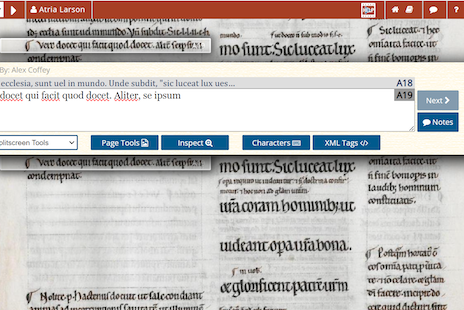SLU Team Wins NEH Grant to Revamp Critical Humanities Software
Saint Louis University researchers Patrick Cuba, Bryan Haberberger, and Atria Larson, Ph.D., have been awarded a Level III Digital Humanities Advancement Grant from the National Endowment for the Humanities (NEH). The roughly $450,000 grant will support the reinvigoration of TPEN, a well-established and internationally utilized transcription program.
Former SLU medieval theology faculty member Jim Ginther first envisioned TPEN —which stands for Transcription for Paleographical and Editorial Notation — 10 years ago, and the program was built with funding from the Mellon Foundation and the NEH. The software package produces transcriptions from digital images of pages of manuscripts, mapping the text to the region on the image from which it was derived. For the past decade, this free-of-charge software has helped humanities scholars the world over to transcribe and export texts line-by-line for preparation of editions and publications of all manner of texts, in numerous languages.
For example, Larson, associate professor of Medieval Christianity and a SLU Research Institute Fellow, has made frequent use of TPEN in her Gallery of Glosses project, which won a NEH Digital Humanities Advancement Grant in August 2022. Larson and her colleagues have used TPEN to transcribe hundreds of glosses (or textual annotations) in medieval manuscripts. They then import the transcriptions into a bespoke platform, along with linked images from TPEN so that the transcribed text is always digitally encoded in connection with real images of the original medieval manuscript. According to Larson, Cuba and Haberberger have tirelessly sustained TPEN over the years. "For 10 years, digital humanities at SLU has been linked in many scholars' minds around the world with TPEN,” she said. “But the program has been in need of new investment of time and resources.”
Larson added that she and her team wrote the proposal for the NEH grant hoping that the organization would recognize the need to redesign TPEN, bringing it up-to-date for contemporary web standards and adding new features that humanities scholars have wanted to see become a reality for some time, and that NEH would see the potential for her, Cuba and Haberberger to accomplish that goal.
“We are delighted that the NEH did recognize the potential, and we are also grateful to the Research Institute for support in the form of matching funds,” she said. “As for me, I am honored to play a small role in SLU's continued research strength in Digital Humanities and Medieval and Renaissance Studies and to partner with Patrick and Bryan in this renewed endeavor."
Cuba and Haberberger, members of SLU's Research Computing Group, will perform the technical work of updating TPEN, coordinating with Larson, who will oversee use-cases with a variety of text, images, and diagrams in manuscripts.
The grant won by Larson, Cuba, and Haberberger is one of dozens awarded by the NEH today.
“It is my great pleasure to announce NEH grant awards to support 260 exemplary humanities projects undertaken by scholars, higher education institutions, and organizations of every size,” said NEH Chair Shelly C. Lowe (Navajo). “This funding will help preserve and expand access to community histories, strengthen the ability of small museums and archives to serve the public, and provide resources and educational opportunities for students to engage with history, literature, languages, and cultures.”


















